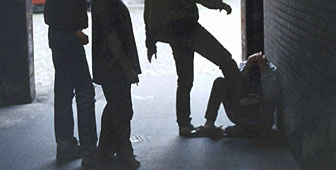Scooter death tests Swiss law to limit

Swiss laws on youth crime are being called into question as a nine-year-old girl in Zurich faces possible prosecution for negligent homicide.
Police are still deciding what action to take against the youngster who knocked down an 87-year-old man while riding her micro scooter along a pavement.
The man was taken to hospital and died three days later from head injuries sustained in the collision. The accident marked the first death in Switzerland to involve a micro scooter.
Under current Swiss law, anyone aged from seven to 15 can be held legally accountable for their actions although the punishments are much less severe than in adult courts.
“She could just be given a warning, or she could be told to do community service,” regional prosecution office spokesman Hansuli Gürber told swissinfo. “In the case of community service, the very maximum [sentence] would be five days’ work.”
“We always look to find types of work that suit the individual child involved,” Gürber stressed. “It is not primarily about punishment, and the [community service] should act as a means of lifting the load off the child, actually doing him or her some good.”
Immune from prosecution
Politicians are already discussing a change in the national law to make children under the age of ten immune from legal prosecution, but the new regulations are not expected to come into force until 2004 at the earliest.
For some observers though, even the proposed change in legislation falls short of protecting children’s interests.
“What I object to is the carrying out of actual criminal proceedings,” says Zurich university criminal law professor Stefan Trechsel. “As soon as you investigate the technicalities of negligence, the child will be reminded again and again that they have caused someone’s death.
“I imagine that places a very traumatic burden on the child, who would be better served with measures of care and education, or perhaps even an appeal for the child to be more responsible in the future.”
Crime victims
Gürber sympathises with many of the arguments made against Switzerland’s current system and is himself in favour of raising the age limit for prosecution. However, the prosecutors’ office believes that state officials must also remember their duties to victims of crime.
“Both the victims and their families have the right to a proper explanation for what has happened and to know who was responsible,” Gürber insists, “although in this latest case everyone seems to agree that it makes little sense to punish so young a child.
“None of the cantonal prosecutors came out against the idea of raising the age limit,” Gürber adds. “Originally the limit was supposed to be set at 12 or 14 years of age, but the [Jamie Bulger] case in England, when two ten-year-old boys killed a toddler, forced a re-think.”
Having worked on the expert committee that first proposed the higher age limit, Trechsel counters that the law should not be shaped to fit in with such extreme and isolated crimes as that of the Bulger case.
And even in such horrific cases, the professor believes the children involved should be treated very differently from adults.
Rights of children
“The European Court of Human Rights has already said that the heavy criminal proceedings in the Bulger case was in violation of the fundamental rights of children,” Trechsel points out. “There is no doubt that children who commit such acts are deeply disturbed but I think education, help and care should be the main concern.”
While admitting that it can be very difficult to set a precise age for legal responsibility, Trechsel feels that the proposed ten-year-old limit is still too low.
“There will always be discussions about this, but I would personally favour setting the age limit at 12,” he argues. “I just think you can generally see a development between the ages of ten and 12, after which the child has an enhanced ability for taking responsibility.”
by Mark Ledsom
Under current Swiss law anyone above the age of seven can be held legally responsible for their actions.
Below the age of 15, children who commit crimes can be given a formal warning or made to do community service.
Proposed changes to the law would free children under the age of ten from legal accountability.

In compliance with the JTI standards
More: SWI swissinfo.ch certified by the Journalism Trust Initiative









You can find an overview of ongoing debates with our journalists here . Please join us!
If you want to start a conversation about a topic raised in this article or want to report factual errors, email us at english@swissinfo.ch.